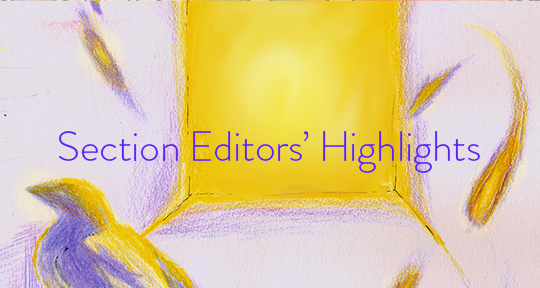Our Winter 2021 issue marks a decade of diving into the languages of the world (our archive now boasts 113 of them!) in all their incredible singularity and variegation. Spanning thirty-one countries, this milestone edition feels like a fitting way to honor a decade of hard work behind the scenes. After hearing from our blog editors last week, let’s pass the mic to the very editors who had a hand in putting together the issue itself.
“Is it a Comedy? Is it a Tragedy?” Thomas Bernhard asks in our debut issue from January 2011. Ten years later, Brazilian author Adelice Souza’s fever-dream of a story (in Padma Viswanathan’s pitch-perfect translation) provides a direct enjoinder: “The play wasn’t a comedy, nor was it a tragedy . . . It was a drama very specifically for those two women.” Just as in Bernhard’s story, the point is not the play at all—we hardly know what the play is about, other than the fact that its two actresses play a lonely woman and her dog, and that tragedy ensues when one demands to switch roles with the other. In contrast to Bernhard, who focuses squarely on the theatre-goer, Souza makes it all about the two actresses whose eight years of traveling with the play to multiple cities have “put them through every type of relationship.” It’s not a story one imagines being plotted out; rather, the work feels like it has been ejected, like toothpaste from a tube, sentence by exhilarating sentence. In the “Brave New World Literature” Special Feature, we also come full circle but in a different way via the return of frequent contributor Jeremy Tiang, who debuted as a translator in our first issue. Combining pop-cultural references with theory, “The World Is Not Enough” is full of quotable gems, but nowhere is Tiang more on-point than when he muses, “Perhaps if the dominant anglophone culture actually acknowledged itself to be part of the world, rather than treating ‘world literature’ as a spice rack to save itself from total blandness, more than three percent of books published in the United States would be in translation?” Finally, anyone who is curious about the workings of a magazine of world literature other than our own will find plenty of food for thought in John Freeman’s riveting piece on how he remade Granta into a global publication.
—Lee Yew Leong, Fiction Editor and ”Brave New World Literature“ Special Feature Editor
Max Rojas is a constant enthusiasm of mine and so I was thrilled to showcase a pretty sizable excerpt from Zane Koss and Gerónimo Sarmiento Cruz’s translation—the very first in English—in all its shining, breathless glory. Even though it’s a mere sliver of a doorstop-sized poem, it’s an excellent sample of Rojas’ talent and an overdue introduction for the Anglosphere. The language of Bodies is both baroque and ephemeral, rugged and philosophical, and its tone swings between that of a theologico-political treatise and a declaration of war. It’s some of this last century’s densest and most sophisticated Spanish-language verse, and some of the most woefully unknown.
—Garrett Phelps, Poetry Editor READ MORE…




Blog Editors’ Highlights: Winter 2025
Reviewing the manifold interpretations and curiosities in our Winter 2025 issue.
In a new issue spanning thirty-two countries and twenty languages, the array of literary offers include textual experiments, ever-novel takes on the craft of translation, and profound works that relate to the present moment in both necessary and unexpected ways. Here, our blog editors point to the works that most moved them.
Introducing his translation of Franz Kafka’s The Trial in 2012, Breon Mitchell remarked that with every generation, there seems to be a need for a new translation of so-called classic works of literature. His iteration was radically adherent to the original manuscript of The Trial, which was diligently kept under lock and key until the mid-fifties; by then, it was discovered exactly to what extent Max Brod had rewritten and restructured the original looseleaf pages of Kafka’s original draft. It is clear from Mitchell’s note that he considers this edit, if not an offense to Kafka, an offense to the reader who has lost the opportunity to enact their own radical interpretation of the work: an interpretation that touched Mitchell so deeply, he then endeavored to recreate it for others.
In Asymptote’s Winter 2025 Issue, the (digital) pages are an array of surprising turns of phrase and intriguing structures—of literature that challenges what we believe to be literature, translations that challenge what we believe to be originality, and essays that challenge what we believe to be logic. I am always drawn to the latter: to criticism, and writing about writers. As such, this issue has been a treat.
With the hundredth anniversary of Kafka’s death just in the rearview and the hundredth anniversary of the publication of The Trial looming ever closer, the writer-turned-adjective has not escaped the interest of Asymptote contributors. Italian writer Giorgio Fontana, in Howard Curtis’s tight translation, holds a love for Kafka much like Breon Mitchell. In an excerpt from his book Kafka: A World of Truth, Fontana discusses how we, as readers, repossess the works of Kafka, molding them into something more simplistic or abstract than they are. In a convincing argument, he writes: “The defining characteristic of genius is . . . the possession of a secret that the poet has no ability to express.” READ MORE…
Contributors:- Bella Creel
, - Meghan Racklin
, - Xiao Yue Shan
; Languages: - French
, - German
, - Italian
, - Macedonian
, - Spanish
; Places: - Chile
, - France
, - Italy
, - Macedonia
, - Switzerland
, - Taiwan
, - Turkey
; Writers: - Agustín Fernández Mallo
, - Damion Searls
, - Elsa Gribinski
, - Giorgio Fontana
, - Lidija Dimkovska
, - Sedef Ecer
; Tags: - dystopian thinking
, - identity
, - interpretation
, - nationality
, - painting
, - political commentary
, - revolution
, - the Cypriot Question
, - the Macedonian Question
, - translation
, - visual art
, - Winter 2025 issue
, - world literature